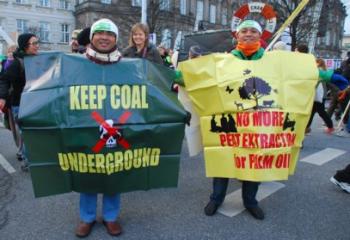- Home
- About
- Campaigns
- Regions
- Themes
- Agrofuels
- Climate justice
- Coastal communities and fisheries
- Disasters
- Economy & debt
- Energy
- Foreign investment
- Forests & forest fires
- Human rights
- Indigenous Peoples
- International Financial Institutions
- Land and food security
- Laws & regulations
- Mining, oil & gas
- Plantations
- Politics & democracy
- REDD
- Regional autonomy
- Transmigration
- Water and dams
- Women
- Publications
- Links
- Contact
Region
- Indonesia (15)
- Sumatra (6)
- Kalimantan (4)
- Papua (2)
- Europe/UK (13)
- International (6)
Home › Campaigns › Publication: Newsletter articles › Campaign: Agrofuels and oil palm plantations ›
Climate justice

Indonesian civil society protest in Copenhagen, December 2009

